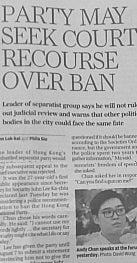The Chinese government’s Mainlandization of Hong Kong is clever – sufficiently incremental and wearing to avoid much outrage. The forthcoming ban of the HK National Party is the latest in a series of steps including the denial of registration and permits to groups and the disqualification of election candidates on the grounds that they are separatist. Each step seemed minor enough for most people to shrug off. The Chief Executive can now openly suggest that expression of an opinion will be a crime, and no-one pays much attention.
But the process is happening on multiple fronts simultaneously, so you can’t keep up anyway. Few notice as a string of mostly obscure and uninteresting academics don’t get promoted. Then one day suppression of opposition and dissent on campuses has become normal. One prominent economist who has just retreated from the Mainland says:
I did not even apply in Hong Kong because to sum up a number of conversations: the writing is on the wall and happening fast, in a few years, Hong Kong universities will be Chinese universities. Don’t bother.
 With disqualifications of candidates and the transformation of elected bodies into Mainland-style rubber stamps, don’t bother voting, either – but maybe people are realizing that. There’s no point in legitimizing a fake process.
With disqualifications of candidates and the transformation of elected bodies into Mainland-style rubber stamps, don’t bother voting, either – but maybe people are realizing that. There’s no point in legitimizing a fake process.
However, Hong Kong’s resistance still sees hope in the legal system and courts. HKNP should definitely give it a try.
It’s not that the judicial system can dependably protect people’s rights any more. But by going to the courts, you force Beijing to show its hand – or its face. Every ‘interpretation’ (with retroactive effect) of the Basic Law or other Communist rule-by-law device humiliates Hong Kong’s local puppet administration and exposes what is really happening and who is doing it.



If the govt doesn’t win in the courts, expect an interpretation from the NPC SC. They can’t bear to win this and could even pre-empt the court as they did with the LegCo members oath case.